AWM41 970 - [Nurses Narratives] Sister Dowling
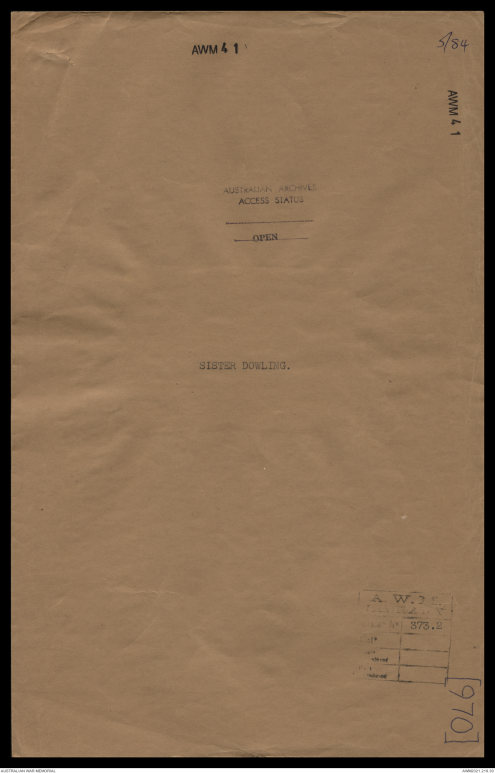
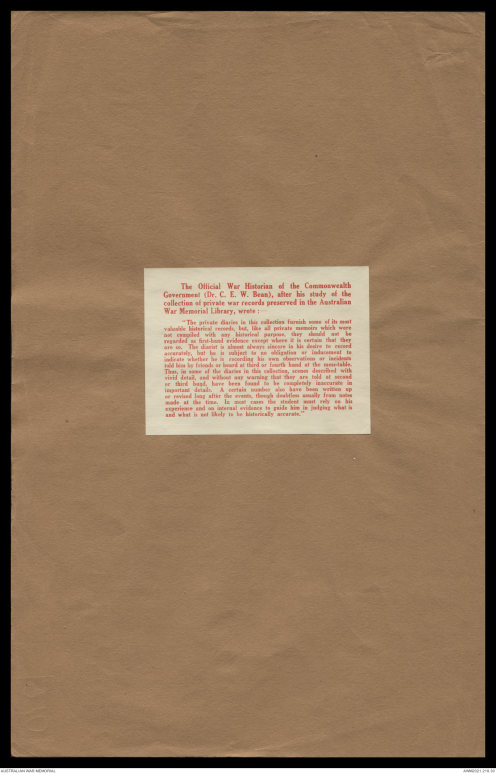
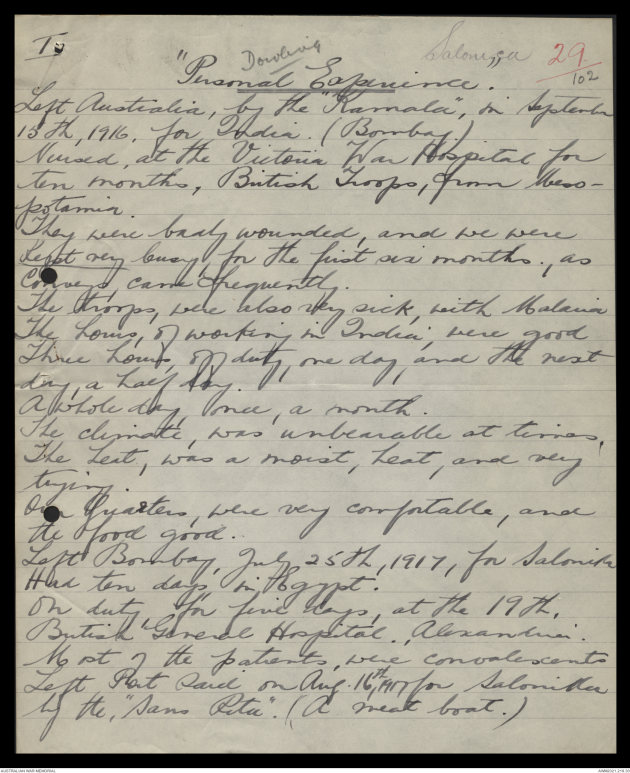
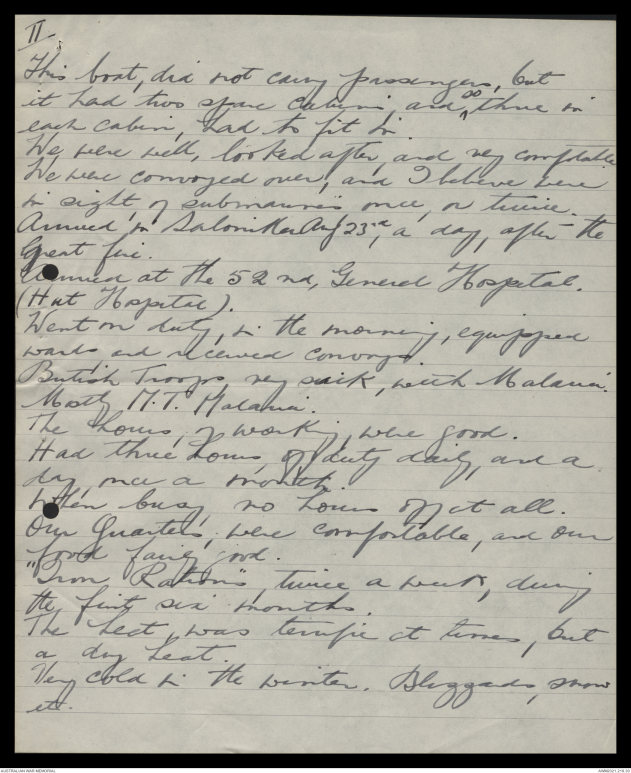
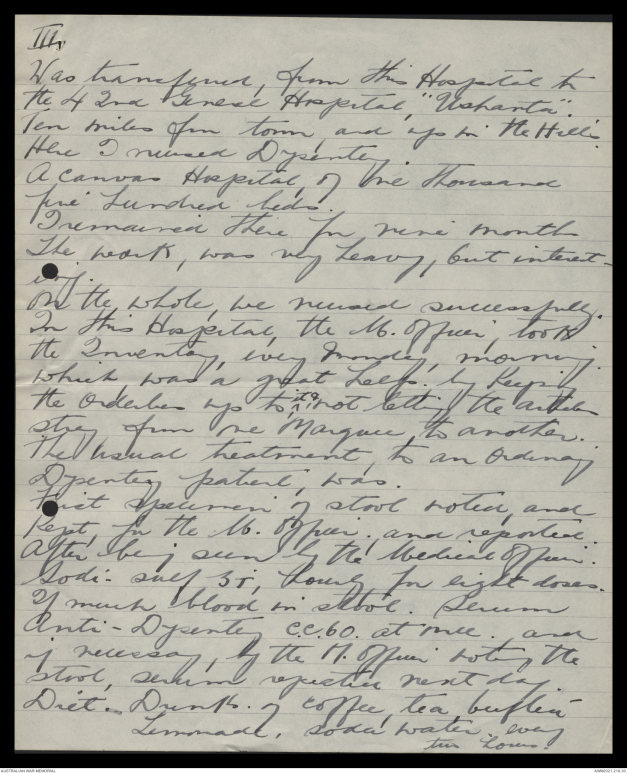
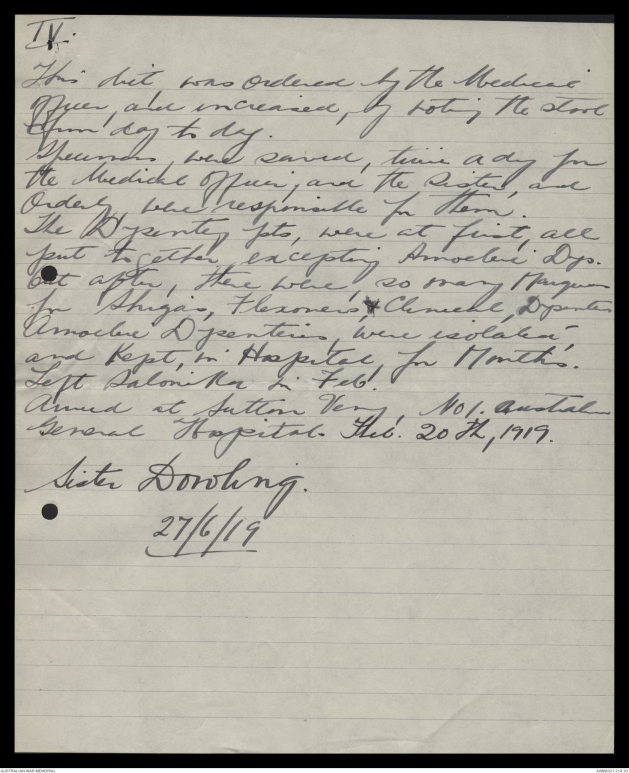
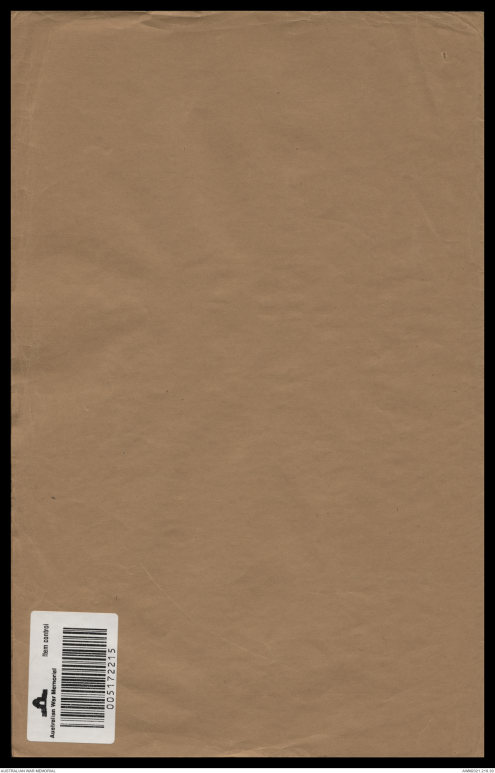
AWM 41 5/84
AUSTRALIAN ARCHIVES
ACCESS STATUS
OPEN
SISTER DOWLING.
[*[970]*]
The Official War Historian of the Commonwealth
Government (Dr. C. E. W. Bean), after his study of the
collection of private war records preserved in the Australian
War Memorial Library, wrote :
"The private diaries in this collection furnish some of its most
valuable historical records, but, like all private memoirs which were
not compiled with any historical purpose, they should not be
regarded as first-hand evidence except where it is certain that they
are so. The diarist is almost always sincere in his desire to record
accurately, but he is subject to no obligation or inducement to
indicate whether he is recording his own observations or incidents
told him by friends or heard as third or fourth hand at the mess-table.
Then, in some of the diaries in this collection, scenes described with
vivid detail and without any warning that they are told at second
or third hand have been found to be completely inaccurate in
important details. A certain number also have been written up
or revised long after the events, though doubtless usually from notes
made at the time. In most cases the student must rely on his
experiences and on internal evidence to guide him in judging what is
and what is not likely to be historically accurate."
I
Dowling
Salonica 29/102
"Personal Experience."
Left Australia, by the "Kamala", on September
15th, 1916, for India. (Bombay.)
Nursed, at the Victoria War Hospital for
ten months, British troops, from Mesopotamia.
They were badly wounded, and we were
kept very busy for the first six months., as
convoys, came frequently.
The troops, were also very sick, with Malaria
The hours, of working in India; were good
Three hours, off duty, one day, and the next
day, a half day.
A whole day, once, a month.
The climate, was unbearable at times.
The heat, was a moist, heat, and very
trying.
Our quarters, were very comfortable, and
the food good.
Left Bombay, July 25th, 1917, for Salonika.
Had ten days, in Egypt.
On duty, for five days, at the 19th,
British General Hospital., Alexandria.
Most of the patients, were convalescents.
Left Port Said on Aug. 16th, 1917 for Salonika
by the, "Sans Rito". (A neat boat).
II
This boat, did not carry passengers, but
it had two spare cabins and ^so three in
each cabin, had to fit in.
We were well, looked after, and very comfortable.
We were convoyed over, and I believe were
in sight, of submarines once, or twice.
Arrived in Salonika Aug 23rd, a day, after the
Great fire.
Arrived at the 52nd, General Hospital.
(Hut Hospital).
Went on duty, in the morning, equipped
wards and received convoys.
British Troops very sick, with Malaria,
mostly M.T. Malaria.
The hours, of working, were good.
Had three hours off duty daily, and a
day, once a month.
When busy, no hours off at all.
Our quarters, were comfortable, and our
food fairly good.
"Iron Rations", twice a month, during
the first six months.
The heat was terrific at times, but
a dry heat.
Very cold in the winter. Blizzards, snow
etc.
III
Was transferred, from this Hospital to
the 42nd General Hospital, "Usharta".
Ten miles from town, and up in ‘the Hills’.
Here I nursed Dysentery.
A canvas Hospital, of one thousand
five hundred beds.
I remained there for nine months.
The work, was very heavy, but interesting.
On the whole, we nursed successfully.
In this Hospital, the M. Officer, took
the Inventory, every Monday, morning.
which was a great help! by keeping
the Orderlies up to ^it, & not letting the Australians
stray from one Marquee, to another.
The usual treatment, to an ordinary
Dysentery patient, was.
First specimen of stool noted, and
kept, for the M. Officer, and reported.
After being seen by the Medical Officer.
Sodi- sulf 3T, hourly, for eight doses.
If much blood in stool. Serum
Anti-Dysentery C.C.60. at once. and
if necessary, by the M. Officer noting the
stool, serum repeated next day.
Diet - Drinks of coffee, tea, beeftea
Lemonade, soda water. every
two hours.
IV.
This diet, was ordered by the Medical
Officer, and increased, by noting the stool
from day to day.
Specimens were saved, twice a day for
the Medical Officer, and the Sister and
Orderly, were responsible for them.
The Dysentery pts, were at first, all
put together, excepting Amoebic Dys.
but after, there were, so many Marquees
for Shigas, Flexoners, & Clinical, Dysentery
Amoebic Dysenteries were isolated, -
and kept, in Hospital, for Months.
Left Salonika in Feb!
Arrived at Sutton Veny, No. 1 Australian
General Hospital. Feb. 20th, 1919.
Sister Dowling.
27/6/19
Australian War Memorial
005172215
 Sandy Mudie
Sandy MudieThis transcription item is now locked to you for editing. To release the lock either Save your changes or Cancel.
This lock will be automatically released after 60 minutes of inactivity.